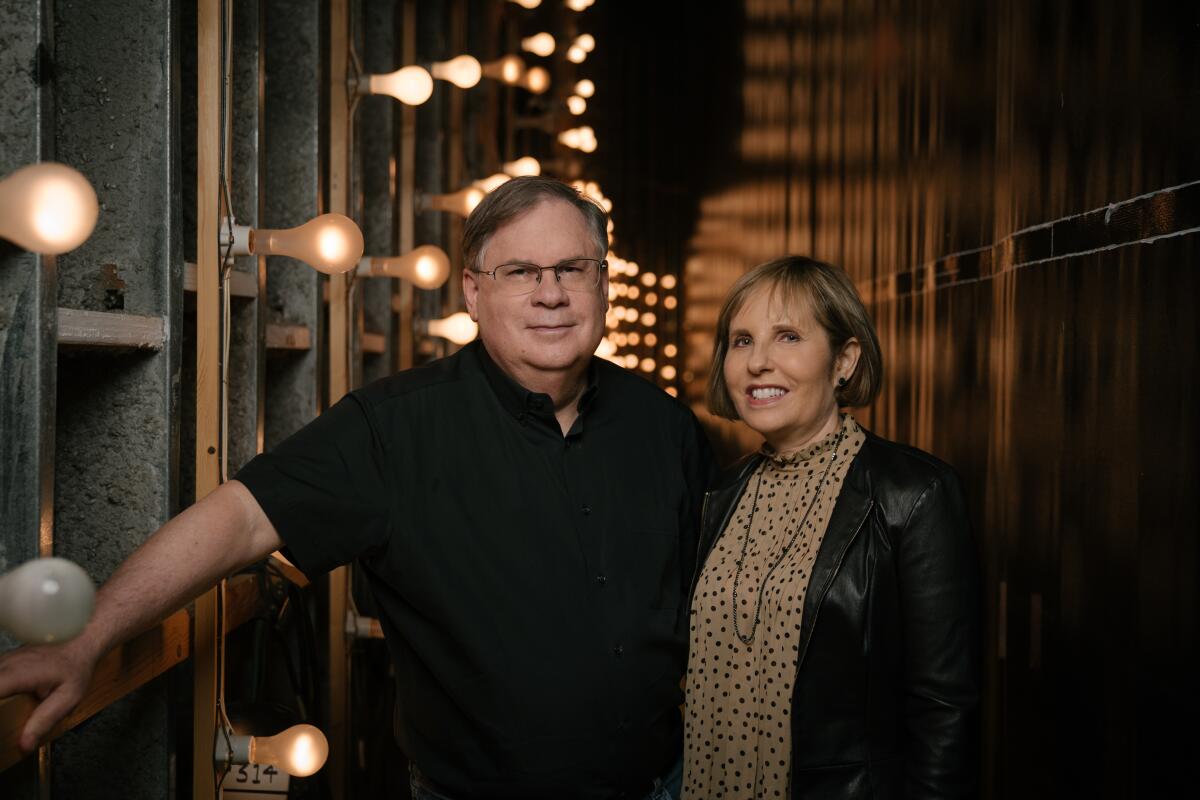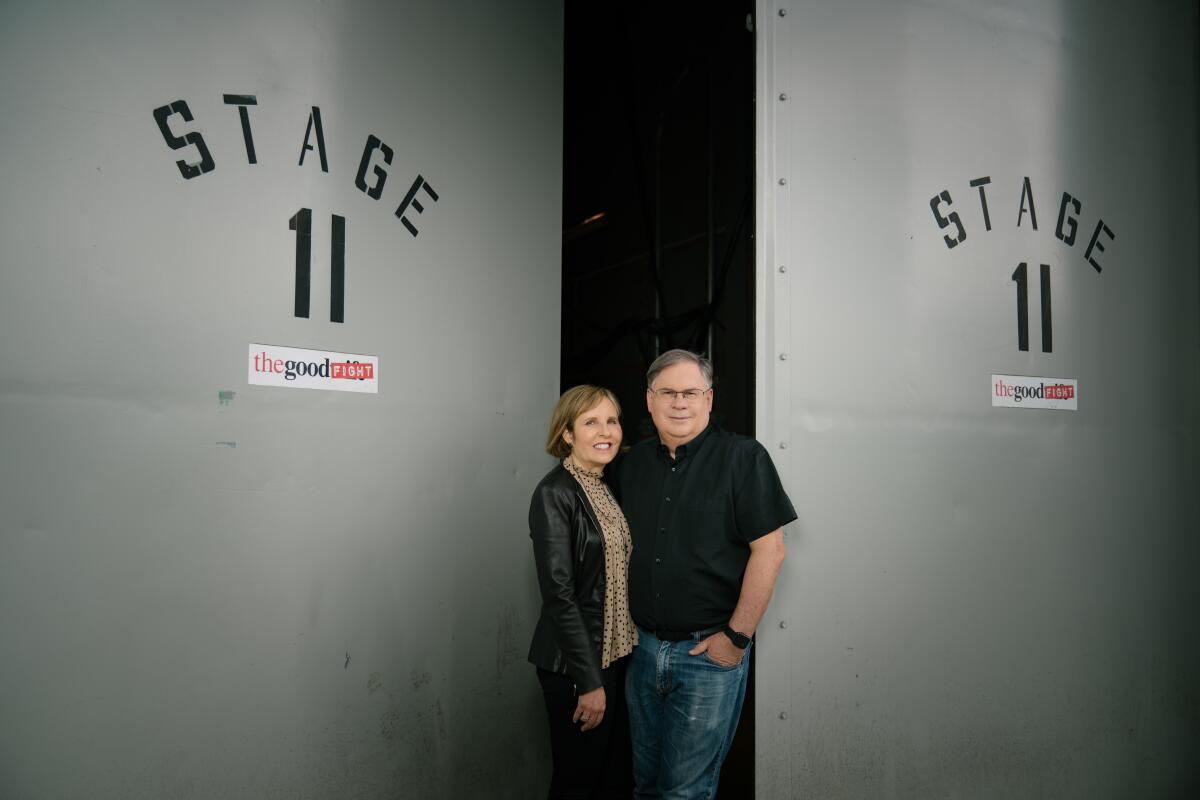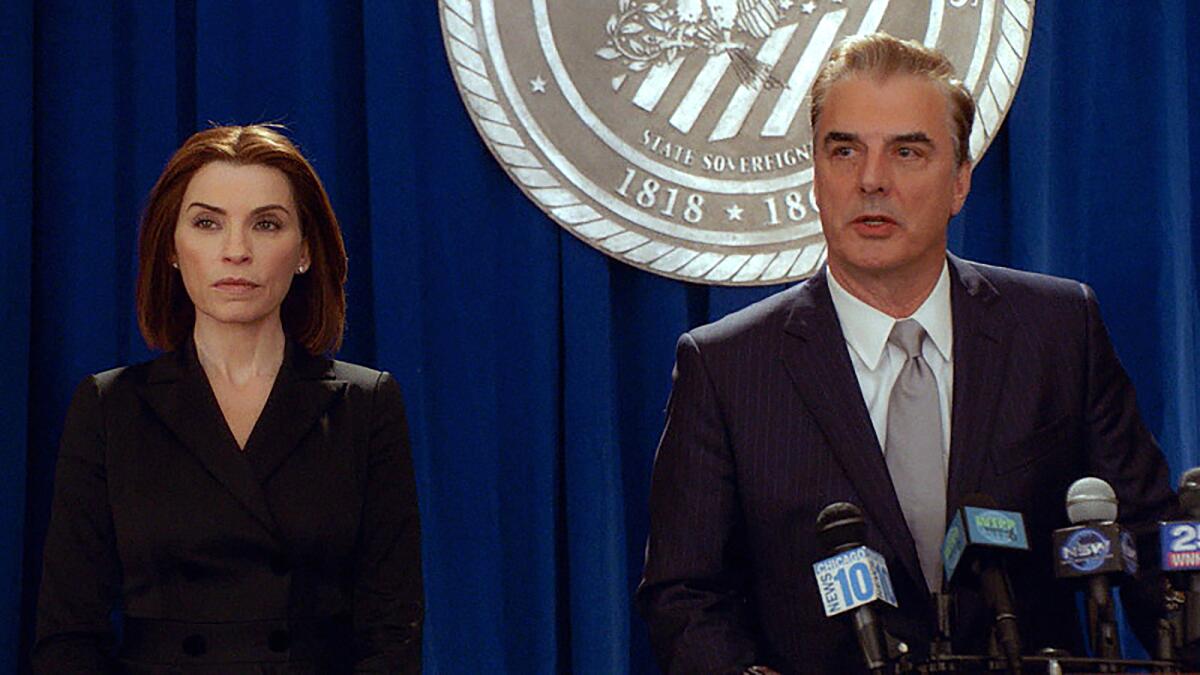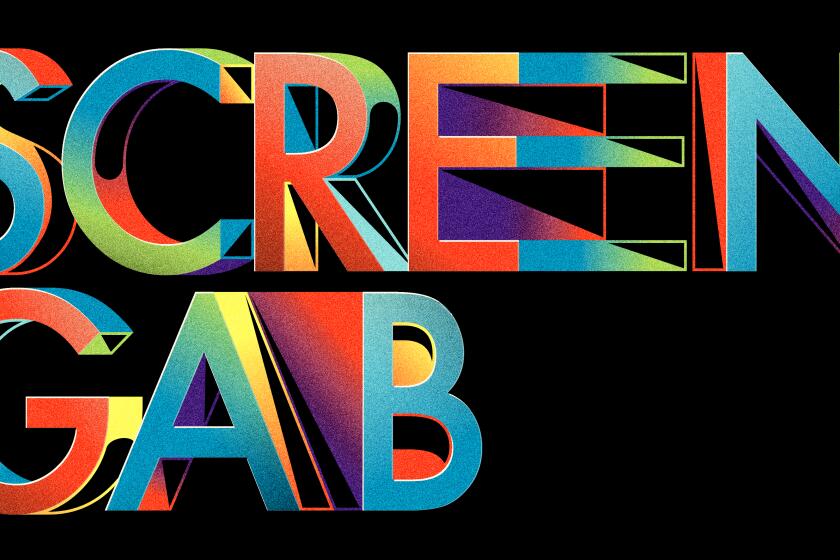On TV’s best political drama, ‘what’s bad for the world is good for our writers room’

- Share via
The most idiosyncratic storyline on TV this summer might be the emergence of a quirky fake judge (Mandy Patinkin) who forms a kangaroo court with an obscure point system, hidden in the back of a copy shop, to adjudicate real disputes over everything from the coronavirus pandemic to the #MeToo movement.
On “The Good Fight,” that’s just the tip of the iceberg.
Whether any of it is plausible is exactly the point, say Robert and Michelle King, the husband-and-wife team behind the Paramount+ legal drama.
“The only worry about the idea was how crazy it was,” recalls Robert, who credits writer Aurin Squire with pitching the concept. “It’s like: Can you imagine that happening? And why would the firm take it seriously? But then [the insurrection at the U.S. Capitol on] Jan. 6 happened, so, no, it’s not crazier than anything that’s happening in real life.”
Hollywood’s most influential showrunners talk with The Times about how they broke into the business, the shifting TV landscape, their writing process and more.
The rise of bingeable, serialized stories in the streaming era has led any number of observers to declare the death of the procedural drama. But the Kings don’t scare easily. Since “The Good Fight’s” predecessor, “The Good Wife,” premiered in 2009, the pair has won praise for energizing the venerable format’s case-of-the-week structure by infusing it with serialized elements and audaciously exploring timely and provocative social issues, all with a playfully subversive embrace of drama, fantasy, satire and supernatural genre elements. The result is nothing less than addictive.
Running two of this summer’s most critically acclaimed shows has only burnished that reputation.
“Evil,” a supernatural procedural that examines the battle between between science and religion, recently moved to Paramount+ from CBS, where it premiered in 2019. (It’s also been helped by the buzz after the first season became available on Netflix last year.) Led by a pair of perfect foils — Katja Herbers’ Kristen Bouchard as the skeptic, Mike Colter’s David Acosta as the believer — it’s been lauded for channeling classic horror tropes into a broadcast format without losing its chill, as in one terrifying Season 1 episode dealing with medical racism.
It’s “The Good Fight” though that’s the jewel in the Kings’ crown. Conceived with the expectation that Hillary Clinton would be elected president in 2016 — a would-be utopia for attorney and liberal diehard Diane Lockhart (Christine Baranski) — the series had to be reworked when Donald Trump triumphed instead. The couple leaned into Diane’s shell-shocked obsession with the goings-on of the 45th president’s controversial administration — opening a portal to storytelling that boldly tackled ripped-from-the-headlines subjects like Melania impersonators, the pee tape and the death of Jeffrey Epstein in ways that few shows have dared.
With Trump, a looming character on the series, out of office, it would have been understandable for “The Good Fight” to change tacks. But for the Kings, it was an opportunity to delve into the fallout from Trump’s exit.
Writing on the season began a few days after election night in 2020, and the events of Jan. 6, in which rioters loyal to then-President Trump stormed the U.S. Capitol in an attempt to overturn Joe Biden’s victory, brought thematic focus to the season, according to the Kings. In addition to the unsanctioned court, designed to illustrate a man taking the law into his own hands, another major plotline this season involves Diane’s husband, Kurt (Gary Cole), getting caught up in the aftermath of the attack.
“Everything we talked about in the room circled back to that day,” Michelle says.
“What’s bad for the world is good for our writers room, unfortunately,” Robert adds. “It’s something our writers can hold on to and say, ‘OK, this is the passion. This is what we’re looking at.’ ... The season is about the worry about the country falling apart. The United States loses its meaning if it’s not united, and there’s this feel in the land that we’ve crossed some Rubicon that is about the connections between us breaking apart.”
Every week, our newsletter will bring you TV and streaming movie recommendations, expert analysis, exclusive interviews and irreverent discussion of the shows, movies and moments everyone’s talking about.
For Baranski, who has worked with the Kings for more than a decade across “The Good Wife” and “The Good Fight” — becoming such close friends with the pair off set that she often attends Mass with Robert — there’s something thrilling about the Kings’ “confidence” and “audacity.”
“They walk to the edge of a cliff, look down and say, ‘OK, we’re just gonna jump off the cliff and possibly offend or possibly be really thought-provoking,’” she says.
It may explain why Colter, who plays a priest-in-training who investigates miracles and demons in “Evil,” remembers being surprised the first time he met the Kings on the set of “The Good Wife,” well into his run as drug kingpin Lamont Bishop.
“When I saw them, they were not so tall,” Colter says with a chuckle. “In my mind, I guess I had thought they were bigger because of the way they write. I know that sounds weird. I think I expected imposing figures, because they’re writing about law and gangsters and manipulative people.”
The Kings are sitting side by side for a video call from their home office in New York, where they’ve spent most of the pandemic conducting virtual writers rooms for their various series — including their COVID-inspired zombie satire for Spectrum, “The Bite” — and editing episodes. To watch them together is like observing one of the couples vignettes from “When Harry Met Sally”: Michelle sometimes shoots Robert a glance when he is too forthcoming. And he seems to like getting that reaction from her.
Their Hollywood love story has its origins in Brentwood circa 1983, deep in the heart of an athletic footwear store called the Frontrunner, where they both worked as young dreamers trying to pay the bills. After graduating from college in Santa Barbara, Robert moved to Los Angeles to try to make it as a screenwriter; Michelle was entering her senior year at UCLA, where she was an English major. “We were told to fill the sock wall with new socks that came in,” Robert says.
The couple, who wed in 1987, would go on to make a career out of working in tandem. But the early years of their Hollywood journey had them on separate paths. Robert was busy writing feature films, including 1994’s “Speechless” and 1997’s “Red Corner,” while Michelle worked in development at various studios and production companies. By 2001, realizing they wanted to write together and figuring that trying something to which they were both new would be the best approach, they developed a series together: a drama about crime at the U.S.-Mexico border called “The Line.”
“We got a lot of interest in the pitch, and there were various people bidding on it, and it was very exciting, and we were so enthused and proud that there was not a single white male lead character — except then, when it came time to make it, everybody was looking at it like, ‘Yeah, but there’s not a single white male lead character,’” Michelle says. “At that moment, a show where at least half of it was going to take place in Tijuana no longer seemed like what they wanted to see on their air. Today might be a very different time for it frankly.”
They continued on, still keen to create a network hit and selling pilots that mostly went nowhere. They developed ABC’s short-lived legal drama “In Justice,” starring Kyle MacLachlan, in 2006. Their breakthrough would come three years later with “The Good Wife.”
“The Good Fight” star Christine Baranski discusses how the series may tackle the coronavirus crisis and that viral Stephen Sondheim tribute.
The groundbreaking drama introduced viewers to Alicia Florrick (Julianna Margulies), the wife of a philandering politician who must navigate standing by her spouse or standing on her own — a stand-in of sorts for figures like Hillary Clinton, Silda Spitzer and Huma Abedin. The series received 43 Emmy nominations during its seven-season run, winning five — sometimes the only broadcast contender in the drama series category. The show set the groundwork for what would come to be regarded as their specialty: incorporating real-world events into their fictional universe.
“I like the idea that you’d be in a supermarket and turn the corner and run into Alicia Florrick or Kristen Bouchard; that they’re living the same experience we’re all living now seems interesting,” Robert says. “So many writers try to avoid the present day because they think their work will last for 18 decades. And it’s like, no, Shakespeare lasts that long. You don’t. So why not use the material of today that in many ways most of us, if not all of us, are experiencing?”
“The Good Wife’s” demanding schedule and high output (20-plus episodes per season) didn’t leave much time to broaden their slate. But after the end of the show’s run in 2016, the Kings made that a priority, with varying degrees of success. Their sci-fi political series, “BrainDead,” had a short run on CBS in 2016. In December, they launched Showtime’s “Your Honor,” starring Bryan Cranston as a respected judge desperate to help his son. And earlier this year came the release of “The Bite,” a six-episode satire set during the pandemic and featuring zombies.
Then there are the shows that never materialized. Before “The Good Wife,” for example, there was an idea inspired by Dominick Dunne and set in the Hamptons called “The Good Life.”

“It was supposed to be the way Dominick Dunne wrote those essays about crime among the rich,” Robert says.
More recently, they conceived a series that would have starred “Friends” alum Matthew Perry, who has appeared on “The Good Wife” and “The Good Fight” as an insurance adjuster tasked with trying to find out how workplace shootings happen and whether there are any pre-employment tests you can apply that would sift out those who would be most prone to open fire. But, as Michelle says, “we’re better off looking forward, rather than backward.”
Last month, the Kings signed a five-year deal that extends their stay at longtime home CBS Studios; it will carry them to a 17-year tenure there — already a lasting marriage by Hollywood standards, but more so as entertainment companies are using pacts worth hundreds of millions of dollars to lure prolific Hollywood players who can bolster their original programming.
“The beauty of the Kings is there is no one definitive brand with them,” says David Stapf, president of CBS Television Studios. “I genuinely believe they can do it all. They don’t think in lanes. They don’t think in pure genres. And they’re certainly not formulaic. It’s a compliment that it’s hard to describe what their brand is. If I had to generalize, it’s incredibly smart, complex, yet accessible explorations of whatever it is that they’re exploring, and it’s always through the lens of, ‘What is it to be human today?’”
Under the deal, they will continue to shepherd “The Good Fight,” which has been renewed for a sixth season, and “Evil,” which has been renewed for a third.

They will also create new shows: They‘re interested in adapting a book and in turning a project about dreams, which they initially conceived as a movie, into a series.
For now though they’re focused on igniting conversation with their current slate — an increasingly difficult target to hit when deciding what to watch requires a spreadsheet. And they’re not disillusioned that splashier streaming platforms like Netflix, HBO Max and Disney+ are where the conversations are concentrated.
“We throw a lot of s— at the wall to try to get it to break through — even having Hillary Clinton win the election in Diane’s imagination [in ‘The Good Fight.’],” Robert says.
“We’re not people trying to hide our light under a bushel; we’re saying, ‘Hey, come over here!’ ... We want this [kangaroo] court storyline to be the subject conversation because it was really built to be a bit of a debate: Is this a good thing or a bad thing? I just don’t know how you [get that conversation now] unless you create ‘WandaVision.’ We know showrunner Jac Schaeffer and the show was brilliant; so was “The Falcon and the Winter Soldier” from Malcolm Spellman.”
He adds: “ We just don’t think people will come after us to write them.”
More to Read
The complete guide to home viewing
Get Screen Gab for everything about the TV shows and streaming movies everyone’s talking about.
You may occasionally receive promotional content from the Los Angeles Times.








